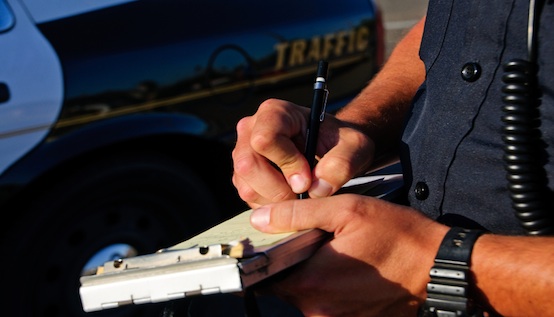
To be completely honest, I have a perfect driving record. I'm not trying to brag... it's just the truth. I have always done everything within my power to be a cautious and safe driver and I haven't had a ticket since my first one that I got when I was sixteen.
Some of my friends on the other hand can't say the same thing, and I thought this was a wonderful article to help you fight a ticket if you feel it was unjust or too steep a charge.
Here’s how to put together an action plan for fighting traffic citations:
Talk your way out of it
The easiest way to avoid getting a traffic ticket is, obviously, to obey the law. But if you are pulled over, the officer can let you off with a warning. Whether that happens can depend on how you act. Here’s a simple guide for what to do when you’re pulled over:
- Be still. Sit with your hands on the top of the steering wheel until the officer comes to the window. If you rummage around in your car, you could create suspicion and security concerns.
- Always have your information. One of my four tickets was for not having my registration. That ticket was dismissed, but I could have avoided the hassle. Never drive without your driver’s license, proof of insurance, registration and any other document your state requires. Keep them up-to-date, and somewhere in your car where you can immediately lay your hands on them when you’re asked to produce them.
- Be polite. You don’t have to flirt (it probably won’t work anyway), but you’ll have a better chance if you’re polite. Traffic cops, like airline ticket agents, often deal with frustrated, angry or impatient people. Being antagonistic won’t take you where you want to go. Give the officer your information when asked, and keep a pleasant tone.
- Don’t admit anything. When the officer asks if you know why he or she pulled you over, say no. The temptation is to immediately confess, then start offering explanations. But admitting guilt could hurt your chances in court.
- Explain. When the officer tells you why you were pulled over, it doesn’t hurt to explain as long as you don’t admit guilt. I once got off with a warning after saying, “I didn’t realize you couldn’t turn right on red there.” Notice that I didn’t say I had turned right on red; I said I didn’t know you couldn’t.
- Ask for a break and you might get one. Once the officer goes back to the patrol car with your license, your opportunity to negotiate is over. Don’t wheedle or whine, but there’s nothing wrong with looking the officer in the eye and saying, “I’d really appreciate you issuing a warning rather than a citation. My driving record is clean and I’d really like to keep it that way.” Throw a fit, raise your voice, tell obvious lies, or do anything else that’s irritating and you’re virtually writing your own ticket.
Prepare for court
If you do get a ticket, the game’s not over. You can still fight it. Prepare ahead of time and you’ll increase your odds of winning.
- Take notes. Before you pull away, take a few notes. Record what time you were pulled over, what the officer said you did, what you thought you did, and anything else worth remembering. For example, if the officer said you were driving at 42 mph and you thought you were going 35, make a note. Take a few pictures of the scene if you can. In my case, the cop said I had made an illegal left turn, but there were no visible warning signs and I’d made that turn dozens of times. I took pictures, and the judge dismissed the ticket because he couldn’t see a “no left turn” sign either.
- Check for errors. Check your ticket. Judges sometimes drop tickets because of inaccurate or incomplete information. Make sure everything is correct down to the spelling of your name. It’s worth a shot.
- Delay. Whenever possible, ask for a continuance. The more time that passes between the day you were pulled over and your court date, the less likely the officer will remember you and the details of the event. If they don’t remember you, you’ll have an easier time defending yourself. And if they don’t show up in court, case dismissed.
- Research. Before you go to court, read up on the laws for traffic citations and about your specific alleged violation (listed by number on your ticket). Traffic laws vary by state, and the more informed you are the better chance you have of beating the rap. For example, one of my citations was for having an out-of-date address on my driver’s license, but the law says I had 30 days to change my ID. Because I’d lived in my house for only three weeks, I produced a copy of my lease and the ticket was dismissed. Check your state’s official website or the department or division of motor vehicles’ website, or general sites like AAA’s Digest of Motor Laws.
- If you fight and lose, it’s time to negotiate again — this time with the judge. “Your honor, this fine would create a real financial hardship. Would you consider waiving it?” “Your honor, the points for this ticket will make my insurance increase to a level that would create a real financial hardship. My record has been clean. Would you waive the points?”
Hiring a lawyer
The problem with pleading not guilty and going to trial is that even if you win, you’ll lose a lot of time.
Because traffic court is typically crowded, it’s not unusual to sit in court for hours waiting for your case to be called, especially in urban areas.
Hiring an attorney who specializes in traffic citations solves this problem, and could radically enhance your odds that the judge will dismiss the tickets or reduce the fines and waive the points.
The lawyer Stacy interviewed for the video said about half of the tickets his firm handles are dismissed, and it’s successful in avoiding points in 95% of cases. The firm charges $80 per ticket.
Of course, the availability, price and success rate of lawyers can vary widely. Do a search for “traffic ticket defense (your city)” and see what comes up.
Tips to help you find the right lawyer:
Ask for referrals. Your friends or family might have a great attorney.
Interview, at least on the phone. Talk to the office and ask about success rates and cost.
Ask for credentials. Always ask about an attorney’s training and experience.
Traffic school
If all else fails and you have to pay fines, you may still be able to avoid points that could cause your insurance rates to rise. (Get enough points and you might lose your license.)
Signing up for traffic school, if that’s an option in your state, allows you to skip the points in exchange for taking a driver’s education course.
They’re typically limited – for example, you can only choose driving school once a year – and you’ll have to pay for the school in addition to your fine, but it’s a better option than points.
You can get a list of traffic school options at your local courthouse.
Bottom line
Laws promoting safe driving serve a purpose: They make our streets safer.
But some argue it’s not fair to pay large fines and insurance-related penalties for years after a minor traffic violation. If that’s you, the next time you get a ticket, don’t fold; fight.
Thanks, Mint!







